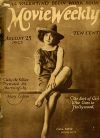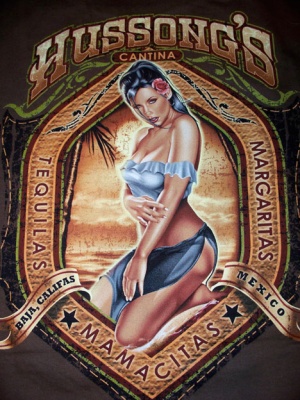Chapter 2
- Please keep these annotations SPOILER-FREE by not revealing information from later pages in the novel.
Page numbers refer to editions with 385 pages, where the story begins on page 3. Not sure if there are other editions with variant pagination. Please let us know otherwise.
Page 14
"logger types, fallers, choker setters..."
Faller (aka "cutters") are the elites of logging. Their work is very dangerous as they cut down the trees that are then processed by others. The faller often works shorter hours, and usually works alone. A choker setter fastens chokers — devices constructed from five-to eight-foot lengths of 3/8ths diameter steel cable with a sliding bell attached — around logs so they can be moved by the yarder, cat, or skidder. It's usually the initial job that a logger will obtain on a logging crew. [1]
The first of many fictitious movies. It's easy to tell, because Pynchon always provides a bracketed date [1980] when he references a real movie, but not a fictitious one. Pia Zadora, whose film career (eg. Santa Claus Conquers the Martians) was going nowhere until she married Israeli multimillionaire Meshulam Riklis in 1977, had some success in film and music, but no longer. Not sure of the connection with the famous silent-film actress Clara Bow.
Throughout Vineland Pynchon tosses off "Actor X in Movie Biography Y" jokes. Each is a horrendous miscasting. In this case the truly charismatic Clara Bow is played by the money-inflated Pia Zadora.
In Orwell's 1984, the Party continuously rewrites history by falsifying records, altering photographs, and vaporizing witnesses. In Pynchon's 1984, Hollywood continuously rewrites history by producing made-for-TV movies.
"Zoy-oyd..."
Prairie is a wonderfully drawn 14-year-old teenager.
"ancient surfer baggies [...] and a dilapidated Hussong's T-shirt..."
Baggies — swim trunks that were about knee-length and, yes, baggy — were a radical departure from the short and tight men's swimware prevalent in the 60s. They were part of the surfer uniform and were memorialized in song by the Beach Boys and other "surf" groups (The Fantastic Baggies, for one!). So Zoyd's could be over 20 years old.
Hussong's, established in 1890 and located in Ensenada in Baja, Mexico, is the oldest cantina in the Californias, and was and is a popular surfers hangout serving primarily beer, piña colladas and peanuts. It’s also the place where the Margarita was invented—back in October, 1941 by bartender Don Carlos Orozco. Zoyd is indeed a California Boy. And it's somewhat likely that Pynchon swung by Hussong's during one of his Mexico visits.
"the Tube"
Consistently capitalized throughout the book.
"a chair-high bag of Chee-tos and a sixpack of grapefruit soda from the health-food store."
This combination of junk food and health food defines the North Coast redneck hippie perfectly. But Pynchon's insistent hammering on Zoyd's junk-food habit may go a little deeper — like autobiography, maybe?
"news anchor Skip Tromblay"
The French word trembles means "to tremble or shake" and is often used in describing someone's voice. The imperfect form is tremblais. Quivering with excitement?
Page 15
"almost featured on 'Good Morning America'"
15 minutes of almost fame.
"Day-Glo orange [...] some acid green"
"Day-Glo" colors are associated with the Psychedelic Sixties, as they would glow when illuminated with a black light, and "black-light" effects where ubiquitous during that period. "Acid green" makes an appearance in V and Gravity's Rainbow, see also Isaiah's tinted Mohawk on p.17.
"the million crystal trajectories, smooth as fountain-drops"
Cf. In Gravity's Rainbow: "He's afraid of the way the glass will fall — soon — it will be a spectacle: the fall of a crystal palace." (p.3)
"useful distinction between...defenestrative [and transfenestrative] personality"
Cool Pynchonian satire of California Psychobabble. "Defenestration" is throwing something or someone out an open window; "Transfenestration" is throwing someone through a closed window, breaking the glass, natch. According to Wikipedia, the term was coined around the time of an incident in Prague Castle in the year of 1618, i.e., the Defenestrations of Prague.
Page 16
"named himself after what again, some robot?"
Zoyd's comment in response to Prairie calling her boyfriend "the Big I." "I, Robot" is the title of a 1939 short story by Eando Binder and a 1951 short story collection by Isaac Asimov. The Asimov stories are [very loosely] the basis for the Will Smith movie of the same name. This also explains Zoyd calling Isaiah "R2D2".
Isaiah Two Four
Zoyd is right. This verse is about turning away from war toward peace: "And he shall judge among the nations, and shall rebuke many people: and they shall beat their swords into plowshares, and their spears into pruninghooks: nation shall not lift up sword against nation, neither shall they learn war any more."
This verse is also the basis for the well known civil rights song "Ain't Gonna Study War No More" (aka, "Down by the Riverside").
"Love is strange"
Refers to Mickey and Sylvia's (Mickey Baker and Sylvia Vanderpool) 1957 Top-40 hit song "Love is Strange". Clearly on Pynchon's Top-40, as well; he used it as the lead for his New York Times Book Review piece on Love In the Time of Cholera:
- Love, as Mickey and Sylvia, in their 1956 [sic — it reached #11 on the Billboard charts in March 1957] hit single, remind us, love is strange. As we grow older it gets stranger, until at some point mortality has come well within the frame of our attention, and there we are, suddenly caught between terminal dates while still talking a game of eternity. It's about then that we may begin to regard love songs, romance novels, soap operas and any live teen-age pronouncements at all on the subject of love with an increasingly impatient, not to mention intolerant, ear.
The tune was allegedly written by Bo Diddley although it was presented to Mickey and Sylvia as being composed by Bo's wife Ethel Smith. Apparently, Bo didn't want the credit because he was pissed off at his music publishers because they didn't pay him enough. Mickey Baker is considered by some to be the first great rock 'n' roll guitarist and, prior to the duo, he was in a rhythm and blues band with saxophonist King Curtis and Sam "The Man" Taylor. After the success of "Love is Strange," Mickey moved to Paris where he remained for twenty-five years, touring, very rarely, as a blues guitarist.
Listen on YouTube.
Page 17
"Joey Chitwood-type thrill show"
Joey Chitwood (1912-1988), a legendary "Auto Daredevil," started touring with his death-defying troupe in the 1940s, and continued for decades. He was an inspiration for fellow daredevil Evel Knievel (1938-2007).
"his long Mohawk colored a vibrant acid green, except at the tips, where some magenta shade was airbrushed on. Now these happened to be Zoyd's two all-time favorite colors..."
Also two of Pynchon's, the 'quaint sixties combo' of lime green and magenta turning up, like a Bodine character, in almost every novel.
Page 18
"the Uzi machine gun, 'badass of the desert.'"Pynchon seems moderately hung up on rear ends in this book (and elsewhere). The phrase "badass" recurs constantly (as it did in Gravity's Rainbow too, where it achieved Naval Significance as the USS John E. Badass). In addition there's Trasero County (trasero = Spanish for "rump,") Las Nalgas (Spanish for "buttocks,") and Culito Canyon (culito = Spanish for "little ass.") There's also an echo of Da Conho, the cook in V., whose fantasy involved shooting Muslims in Israel with a .30 caliber machine gun that went "yibble, yibble, yibble." ("Da Conho's machine gun was the only one in the world that went "yibble, yibble," Pynchon pointed out.)
Page 19
"from here to Gardena"
Likely a Southern California local phrase used hyperbolically to mean "anywhere," but it specifically references Gardena, California, a city known for its unique culture, especially its famous bowling alley and coffee shop, making it a familiar local landmark for boasting. The 1992 song So What'cha Want? includes the phrase "from here to Gardena." So it's likely Pynchon inspired, or perhaps just SoCal slang? Whatever ever the case, I can't find any references to or uses of that specific phrase that pre-dates Vineland (1990).
| Chapter 1 pp. 3-13 |
Chapter 2 pp. 14-21 |
Chapter 3 pp. 22-34 |
Chapter 4 pp. 35-55 |
Chapter 5 pp. 56-67 |
| Chapter 6 pp. 68-91 |
Chapter 7 pp. 92-106 |
Chapter 8 pp. 107-129 |
Chapter 9 pp. 130-191 |
Chapter 10 pp. 192-203 |
| Chapter 11 pp. 204-217 |
Chapter 12 pp. 218-267 |
Chapter 13 pp. 268-293 |
Chapter 14 pp. 294-322 |
Chapter 15 pp. 323-385 |


